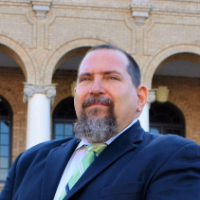 Ocala White Collar Crime Lawyers, Florida
Ocala White Collar Crime Lawyers, Florida
Sponsored Law Firm
-
 x
x

Click For More Info:
-
Joseph A. Gasparro, PA
813 Jackson Rd Jacksonville, FL 32225» view mapCriminal Defense Law Serving the Best Interests Of Our Clients
When you need accurate representation for criminal defense issues, Joseph Gasparro is there for you.
800-971-8621
Not enough matches for Ocala White Collar Crime lawyer.
Below are all Ocala Criminal lawyers.
Sponsored Lawyers
1-10 of 34 matches
Criminal, Accident & Injury, Mesh, Rideshare Assault
Whittel & Melton, LLC is a full service central Florida law practice with an emphasis on representing clients from The Villages in all Personal Injury cases, Wrongful Death tragedies, and serious State and Federal Criminal matters. The firm was formed when Gainesville and Ocala Attorney Robert G. Whittel and Hernando and Sumter County Lawyer Jason M. Melton joined their respective practices to better accommodate their clients in The Villages. The two founding members of the firm are former State Prosecutors and nominees for State and Federal office. Our lawyers and staff are committed to meeting and exceeding our clients' needs. The Villages is a unique and growing area of Florida. No place in Florida is quite like it. We work very hard to accommodate all of our Villages clients. Whittel & Melton's success and reputation has always been based on high quality legal work, performed by well-prepared lawyers who are devoted to their clients. The firm's growth is due in large part to the wide range of services and varied interests of our clients. Our attorneys are proud to deliver a personalized and focused counsel to our many clients in Florida. Whittel & Melton remains dedicated to developing and maintaining long-term relationships in the different communities where we practice. Our firm routinely represents clients from The Villages in the courthouses of Ocala, Bushnell, Tavares, Gainesville, Inverness, Brooksville, New Port Richey, Dade City, Tampa, Orlando and throughout the State of Florida.
(more)Accident & Injury, Criminal, Divorce, Federal
James Michael Sawyer hails from South Florida but has been a resident of Gainesville off and on since the 1970’s when he moved here to attend the University of Florida for his Bachelor’s Degree. Mike began a martial arts career as a teenager in Miami, which continued while he attended UF and went on to become one of the world’s foremost promoters and authorities on sport martial arts. He is the co-founder of many prestigious martial art associations including the North American Sport Karate Association (NASKA) and the International Sport Karate Association (ISKA), as well as an on-air expert analyst for ESPN and other sports channels.
(more)Criminal, DUI-DWI, Elder Law
This trial focused practice has the goals of delivering quality legal services, providing to clients personal services while developing strong, trusted relationships through effective communication, analysis, planning and litigation skills seeking the best result possible. Mr. Straile has been a lawyer as a member of the Florida Bar since 2003 and has been working within the court and justice system since 2001; he is a member of the Criminal Law, Family Law, Real Property, Probate & Trust and the Trial Lawyers sections of the Florida Bar. Mr. Straile is a past treasurer for the Eighth Judicial Circuit Young Lawyers Division. Mr. Straile focuses his practice on trial law focusing in family, including domestic violence, traffic, criminal, business law and limited civil litigation or civil trial matters. Family cases include divorce, custody, paternity, modification, domestic violence, child abduction, division of assets, parenting plans, and marital settlement agreements. Mr. Straile handles cases from civil traffic to trafficking narcotics and cases ranging from misdemeanors to life felonies. Mr. Straile has handled all levels of criminal offenses and all issues related to criminal offenses from investigation to verdict and appeal. Mr. Straile represents businesses from start up to litigation after sale. Many clients also have used Mr. Straile to provide general consulting. Mr. Straile earned an LL.M (advanced law degree) from the University of Florida in tax law, a J.D. from St. Thomas University and a B.S. from Lambuth University . Prior to entering the legal field Mr. Straile provided financial services and advice at Banker's Life & Casualty and Morgan Stanley. Mr. Straile spent two years between the Third District Court of Appeal in Miami and the Seventeenth Judicial Circuit State Attorney's Office in Ft. Lauderdale . While in Law school Mr. Straile was active in trial competitions, and coached the St. Thomas Trial Team. Volunteer work includes the Volunteer Income Tax Assistance program and the Boy Scouts of America. Mr. Straile served as an organizer of the Volunteer Income Tax Assistance program and a liaison between the program and the Internal Revenue Service. For the Boy Scouts Mr. Straile taught merit badges, served as quartermaster, and assistant scout master. Mr. Straile is an Eagle Scout.
(more)Accident & Injury, Criminal, Eminent Domain, Motor Vehicle, Lawsuit & Dispute
Mr. Schultz is an accomplished lawyer that has over twenty years of legal experience in accident & injury matters. He also specializes in various aspects of law including criminal, real estate and motor vehicle. In addition to his legal experience, he is active in several different associations including the Florida State Bar Association. Mr. Schultz graduated from the Stetson University School of Law with a J.D. degree in 1993 and admitted to the Florida state bar on May 6, 1994. Benjamin Hall, JD is an expert on accident & injury, criminal, real estate and motor vehicle law.
(more)



 Joseph Gasparro Jacksonville, FL
Joseph Gasparro Jacksonville, FL AboutJoseph A. Gasparro, PA
AboutJoseph A. Gasparro, PA Practice AreasExpertise
Practice AreasExpertise




